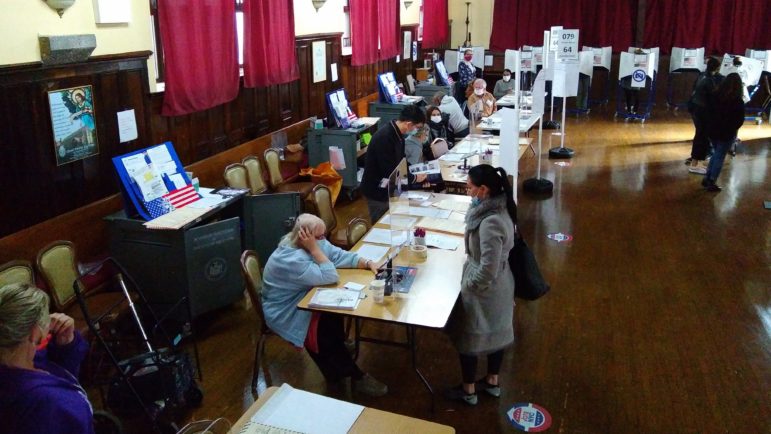
Adi Talwar
The scene inside a polling site at Christ Church in Bay Ridge, Brooklyn, during the 2021 primary.It’s been nearly a year since Democratic frontrunner Eric Adams officially kicked off his campaign for mayor and seven months since his Republican opponent Curtis Sliwa entered the race. New York City has been in election mode ever since.
But after crisscrossing the five boroughs, besting a field of primary rivals and raising nearly $25 million in private contributions and public matching funds, the two contenders face off today (along with a handful of third-party choices) to determine who will run New York City.
So what’s going through their heads? And how might two famously sleep-deprived tough guys handle the home stretch? Former City Comptroller Bill Thompson, who narrowly lost to Mayor Michael Bloomberg in the 2009 general election, joined WBAI’s City Watch this past Sunday to provide some insight.
“It’s exhausting. It’s exhilarating,” Thompson said of the final days of the race. “You go through the ups and downs. You go through people you run into who aren’t going to vote for you and tell you that. And then you run into people and crowds who are voting for you and it just picks you up. It gives you additional energy and the reality is you feed off those crowds. You feed off of people who are encouraging you.”
In 2009, Thompson, a Democrat, found himself in a position somewhat like Sliwa—outraised by a wide margin and with the media already coronating his rival. Thompson said he sought to cut through that narrative.
“What you’re trying to do is get people to turn out,” he said. “Don’t listen to the press. Don’t assume this election’s over. Come out and vote.”
Thompson discussed the strategy that goes into the final days of voter turnout and community visits in an insightful conversation with City Watch co-host Jeff Simmons, his former communications director.
It wasn’t quite enough. Bloomberg outspent Thompson 10-to-1 and won a third term with about 50.7 percent of the vote compared to his challenger’s 46.3 percent.
So would Thompson have done anything different? Things might have worked out “if I could have looked back and got an additional $10 million,” Thompson mused.
Fast forward to the 2021 race, and New York City is on the verge of electing its second Black mayor in Adams. Thanks to term limits, voters are also about to select a vastly changed City Council. And there are five ballot proposals to decide on.
City Limits’ politics reporter Ese Olumhense joined Simmons to discuss the mayoral race, the third-party candidates on the ballot and the issues that Adams and Sliwa have ignored—despite a nearly five-month opportunity between the June primary and the November general election.
Olumhense also broke down some of the competitive races for City Council, including a fight for the last GOP-held seat in Queens (Read her coverage on Council District 32 here), the diverse makeup of the incoming class of lawmakers and the surprising growth of the Republican Party in every borough but Manhattan since 2016.
After Olumhense, New York City Campaign Finance Board Executive Director Amy Loprest called in to discuss the monumental spending in the 2021 Election Cycle, where candidates raised more than $71 million in private contributions. A record 441 candidates opted into the public matching funds program, generating more than $126 million from the city, Loprest said.
“This was an unprecedented election cycle in so many ways,” she told listeners.
And today voters finally get the chance to weigh in.
To get up to speed before hitting the polls, listen to Sunday’s episode of City Watch on WBAI 99.5 FM.
[soundcloud url=”https://api.soundcloud.com/tracks/1151340298″ params=”color=#ff5500&auto_play=false&hide_related=false&show_comments=true&show_user=true&show_reposts=false&show_teaser=true&visual=true” width=”100%” height=”300″ iframe=”true” /]








